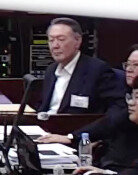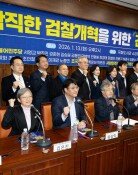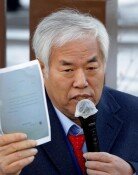Gist of National Assembly interpellations
Gist of National Assembly interpellations
Posted February. 13, 2001 21:11,
Grand National Party (GNP) members of the National Assembly demanded that North Korean leader Kim Jong-Il, when he visits Seoul, should apologize for sparking the 1950-53 Korean War, as well as for the terrorist attack on South Korean government officials in Rangoon (1983) and the bombing of a Korean Air passenger plane (1987).
They told the government on Monday that they would not oppose Kim`s trip here to reciprocate for the earlier visit of President Kim Dae-Jung to Pyongyang but called for the apology for the past wrongs committed by the North. Millennium Democratic Party (MDP) lawmakers countered by saying a preoccupation with these past events would not serve the cause of inter-Korean rapprochement.
Rep. Park Se-Hwan of the GNP said the visit of North Korea`s National Defense Commission chairman ought to be preceded by his apology for the recent past history issues and a declaration of his intention to improve the North`s human rights record.
Rep. Yun Yeo-Joon of the GNP insisted that an apology for the past should be given together with a promise to end the development, production and deployment of weapons of mass destruction, remove conventional arms and troops deployed close to the armistice line and unconditionally repatriate South Korean prisoners of war (POWs) and abductees still held in the North. Acknowledging speculation about the possible adoption of a joint declaration of peace on the Korean peninsula during Kim`s Seoul visit, Yun stressed the need for parliamentary consent to such a crucial statement, saying that it would gravely affect national security.
Rep. Lee Nak-Yon of the ruling party claimed that bringing up past history issues now might stymie reconciliation between the two Koreas, arguing that it would show a more mature attitude on South Korea`s part to straighten out these matters in the course of fostering improved inter-Korean relations in the years ahead. Lee said former President Kim Young-Sam, who pursued a meeting with then North Korean President Kim Il-Sung, was now contradicting himself by opposing Kim Jong-Il`s visit. Lee urged the ex-president to demonstrate statesmanship and deport himself in a manner commensurate with his status as a former head of state, who once declared that the nation comes before ideology.
Rep. Lee Chang-Bok of the MDP argued in favor of an early abolition or revision of the National Security Law and of dropping the characterization of Pyongyang as Seoul`s "chief adversary" in the Defense White Paper.
Opposition lawmaker Lee Jai-Chang expressed fears that the incumbent government, using the North Korean strongman`s visit as the momentum, would seek to amend the Constitution and realign the political sphere so as to keep itself in power. A broad-based national organization embracing leaders from all sectors should be launched to gauge the will of the people on the controversial visit, he said.
Prime Minister Lee Han-Dong said the nation must deal with the situation from a long-term standpoint, looking boldly to the future rather than forcing an accounting for past wrongs. The tense state of past relations with North Korea should not be forgotten, but they should be treated as a lesson for future rumination and judgement at an appropriate time, he said.
Defense Minister Cho Seong-Tae said it would not be proper to change the "chief adversary" characterization at a time when North Korea has yet to take clear steps to alter its longstanding military stance against South Korea.




![[속보]국힘 윤리위, 한동훈 제명 결정…장동혁호 ‘뺄셈 정치’ 가나](https://dimg.donga.com/c/138/175/90/1/wps/NEWS/IMAGE/2026/01/14/133151701.1.jpg)


